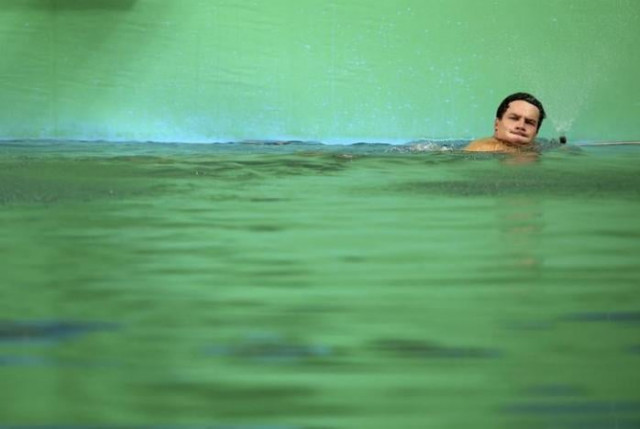Rio organisers reveal why Olympic swimming pool went green
A contractor had added 80 litres of hydrogen peroxide to each of the diving and water polo pools last Friday

2016 Rio Olympics - Diving - Men's 3m Springboard - Maria Lenk Aquatics Centre - Maria Lenk Aquatics Centre - Rio de Janeiro, Brazil - 13/08/2016. Patrick Hausding (GER) of Germany swims in the green coloured water of the diving pool at the Maria Lenk Aquatics Centre. PHOTO: REUTERS
A contractor added 80 litres of hydrogen peroxide to each of the diving and water polo pools last Friday but organisers said they only found out on Tuesday when the water in the diving pool turned green from its typical blue during the women's 10 metre platform final.
The Olympic pool is turning gold medallist Ryan Lochte's hair green
According to organisers, the addition of hydrogen peroxide neutralised the chlorine and allowed algae to bloom. "This is a way of cleaning swimming pools but you're not supposed to combine it with chlorine," Gustavo Nascimento, Rio 2016's director of venue management, told reporters.
"We were not consulted, our contractor's failure is our failure." The green pools have become a huge headache for organisers of the Rio Games, becoming the butt of "swamp" jokes among the millions of spectators in the stands and watching in television. Some water polo players have complained about itchy eyes.
The electronic monitoring system for the pools at the Maria Lenk Aquatics Center was functioning but was fooled by the chemical reaction to think that the chlorine was still working, Nascimento said. The fact that 120 athletes were using the diving pool also increased the amount of "organics" in the water, he added.
What are those circular marks on Michael Phelps’ body?
To treat the water, which organisers said does not pose any risk to athletes, they have been stabilising the chemistry and trying to make the algae more dense to clean it up but were racing against time to avoid disrupting competition schedules.
Nascimento said 10 hours will be spent draining and replacing the water in the pool that will be used for the synchronised swimming event, which begins on Sunday, where competitors need to see each other under water. The organisers will keep the water in the diving pool and continue treatment, as it did not seem to concern the athletes as much, they said.
By Saturday afternoon, the water in the water polo and synchronised swimming pool had already turned a cloudy blue, while the diving pool remained a murky blue-ish green. Rio Games spokesperson Mario Andrada, who declined to answer questions on who the contractor was or who would pay for the treatment, had previously said the issue would be solved by Wednesday but admitted they had overpromised and undelivered. "Of course it's an embarrassment," said Andrada. "This was probably the only issue that we were unable to solve quickly."
Why did the water in Olympic diving pool suddenly turn green?
Luckily for them, divers have been taking it in their stride. "When the water's too murky you can't see the bottom of the pool so it affects your target point when you're doing your turns in the air," China's Shi Tingmao said after placing first in Saturday's women's 3 metres springboard semi-finals. "So it has some impact but it's not a big problem."
American Abby Johnston, who also qualified for the final, said her "chemistry brain was going 'what?'" when told about the hydrogen peroxide dump. "But it's a fun thing for all of us divers to stand up there and talk about. We're all in this together."



















COMMENTS
Comments are moderated and generally will be posted if they are on-topic and not abusive.
For more information, please see our Comments FAQ